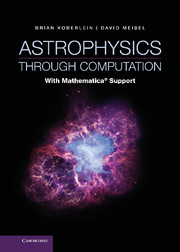Preface
Published online by Cambridge University Press: 05 June 2014
Summary
Why another book on astrophysics? Undergraduates and first-year graduate students are deluged with complex information that they are expected to “know” at least qualitatively, and there are plenty of texts that present just such a broad comprehensive survey of astronomy and astrophysics (either observationally or theoretically) and do that just fine. In fact, there are many things being taught in introductory astronomy classes today that 50 years ago appeared only in doctoral theses. But in those same times there were those (Chandrasekhar, Einstein, Hubble, and Spitzer, for example) who, having no access to the powerful computers of today, developed the elegant analytical and observational theories upon which our modern ideas are based. Not only did these early people work with incomplete data sets and poorly understood physical concepts, but they also had to invent their own mathematical and computational methodologies to make their concepts quantitative. The scientific progress of those times was largely the product of sheer intellect from beginning to end.
Astronomy and astrophysics now make such immense strides almost continuously that undergraduate and beginning graduate students are rarely aware of the extraordinary quantitative foundations given to these disciplines during the nineteenth and twentieth centuries, and this knowledge gap widens with each passing day. There are two factors at work here. First, the analytical mathematics used by these early masters was quite above that usually considered suitable for undergraduate instruction, and second the actual computational programming required to produce realistic modern models these days is considered too sophisticated to be meaningfully approached by all but the most advanced undergraduates and beginning graduate students. Yet NASA and other space agencies have often honored the intellectual giants of this era by naming spacecraft after them without explaining to modern students those lines of mathematical/quantitative reasoning that made possible the revolutions in thought of those scientists.
- Type
- Chapter
- Information
- Astrophysics through ComputationWith Mathematica® Support, pp. vii - xPublisher: Cambridge University PressPrint publication year: 2013

